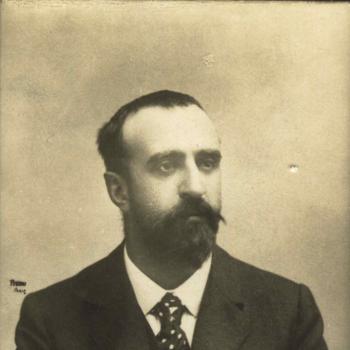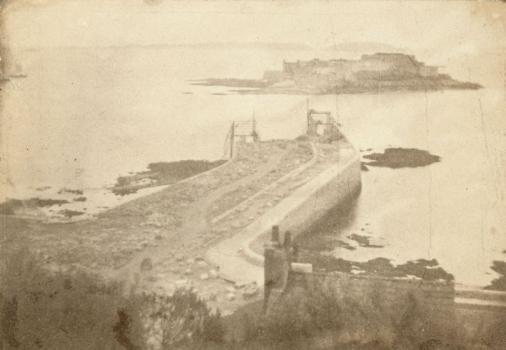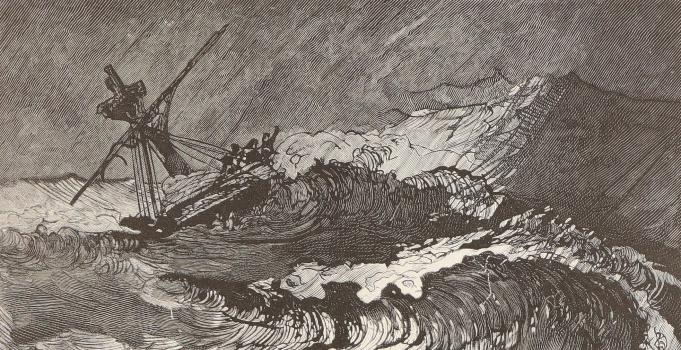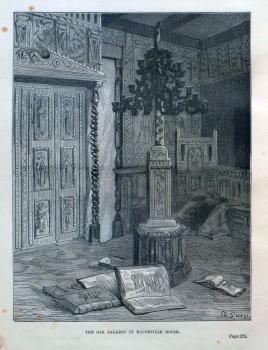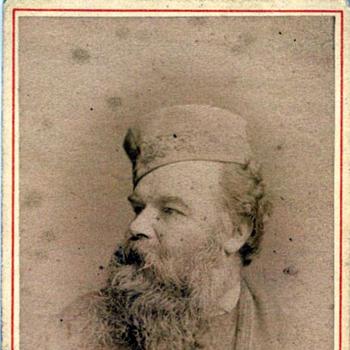8th March 2019
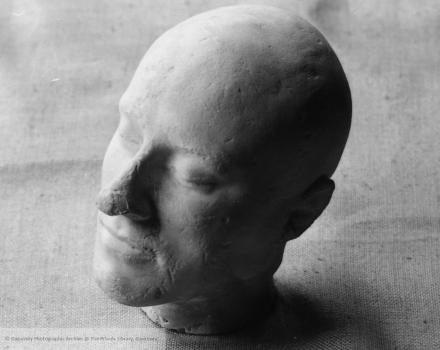
‘Tu ne tueras pas.’ Pas d’exception. ‘Thou shalt not kill.’ No exceptions. [Victor Hugo, 19 Feb. 1854, Marine Terrace, Jersey]. This death mask was kept by Victor Hugo in the Billiard Room in Hauteville House along with his famous drawing of Tapner, 'Le Pendu,' or 'The Hanged Man.' The Billiard Room was also home to portraits of the Hugo family, other favourite drawings, and maps of meaningful places in Hugo's life. The importance of these memoirs of Tapner to Hugo is thus obvious: they were a permanent reminder of the cruelty of man to man, and of his (for him) abject failure to save Tapner from the scaffold. In addition Hugo blamed himself for Tapner's execution, believing that his ardent intervention had actually been counter-productive - that the French government had pressed upon their British allies not to give in to Hugo's wishes, and that the British had complied. This striking photograph of the mask is by the late Guernsey photographer Carel Toms, taken in 1975, and is part of the Guernsey Photographic Archive held at the Priaulx Library.
6th March 2019
Jean-Baptiste Charcot, ‘the Polar Gentleman.’ Doctor, sportsman, Olympic medallist, polar explorer, friend of Captain Scott, and husband of Victor Hugo's grand-daughter Jeanne, this admirable French hero reserved a special place for Guernsey. [By Dinah Bott]
24th October 2018
Opinions on the building of the Castle Emplacement from Victor Hugo and his son Charles. Charles took the accompanying photograph, The Castle Emplacement under construction, c 1856; he also took a fine study of St Catherine's Breakwater in Jersey some years earlier. (Hugo family friend Auguste Vacquerie was also an excellent photographer, and may possibly be responsible for this photograph, but Charles shared his father's appreciation of the effort and skill required to build these types of structures, and of the progress and growth they embodied, and is likely to have found this and the Jersey breakwater an appealing subject). The photograph is in the collection of Paris Musées: Construction de la digue reliant le château Cornet au port, attribuée à Charles Hugo, 1855-6. [By Dinah Bott]
22nd October 2018
The loss of the paddle-steamer Normandy, 17 March 1870
15th October 2018
The exiled Victor Hugo was forced to leave Jersey very quickly. Here he describes his arrival in Guernsey in a letter to his wife, Adèle Foucher, who had remained for the time in Jersey. The image is from a set of engravings of drawings by Hugo in the Priaulx Library collection.
5th July 2018
By Thomas Cave, from the North Devon Journal, September 20 1866. 'It is always interesting to trace the home and associations of an eminent author and to realize a little of the inner life of the man whose works instruct or amuse us, especially when the impress of his mind is so visibly traceable in the material objects about him. It seems as if the fanciful taste which has arranged all these materials at its will in turn receives daily promptings from its very creation.' The engraving of The Oak Gallery is by one of Hugo's favoured artists, Fortune Méaulle, from Alfred Barbou's Victor Hugo and his times, New York: Harper, 1881, in the Library Collection.
19th March 2018
The Priaulx Library has many photographs and cartes de visite by Arsène Garnier, including many of Victor Hugo and his family. This is part of the Victor Hugo and Guernsey project. The carte de visite above is a studio self-portrait from the Library collection, with Garnier's signature red outline and text.
6th December 2017
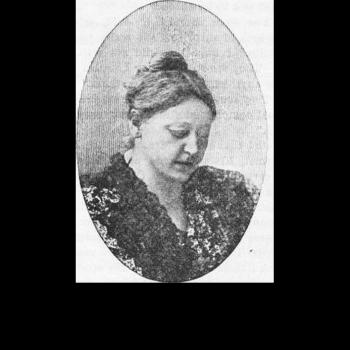
Observations and reminiscences from author Theodora Teeling, from The Star, May 4, 1880. Mrs. Bartle Teeling (née Theodora Louisa Lane Clarke) was born in Guernsey in 1851, the only child of the Rev. Thomas Clarke, Rector of Woodeaton, Oxford, and Louisa Lane, scientist and author of topographical and historical works on the Channel Islands, including contributions to MacCulloch's Guernsey Folk Lore. Theodora 'spent her childhood in Woodeaton, Oxford, where her father was rector. On his death his widow returned with their only child to Guernsey,' in 1865. They lived at L'Hyvreuse Lodge in St Peter Port. In Guernsey her mother Louisa 'became a centre of literary and scientific interest and mental activity as student and writer of natural history, etc., and author of several scientific manuals.'¹ In 1879 Theodora married Bartle Teeling (1848-1921), Captain in the Rifle Brigade, Secretary (1872) of the Catholic Union of Ireland, and Private Chamberlain to the Pope. She died in 1906. Theodora dates her reminiscences to 1867 ('12 years since'), when she would have been aged 16, and to 1878, only two years before she wrote this piece. She would have been 27 years old. The first scene, however, if she has not conflated two Christmases, must date to 1864 or before, as she includes Hugo’s son, François-Victor, in it: or it was indeed 1867, and she has misidentified the men she saw; or she has embellished the truth a little.
8th November 2017
Part of the Victor Hugo and Guernsey project.
9th October 2017
Snippets of the poet's life in Guernsey. This is part of the Victor Hugo and Guernsey project. [By Dinah Bott]


